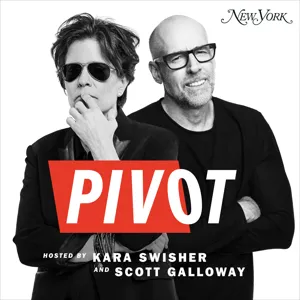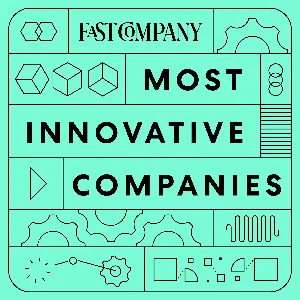Podcast Summary
Exploring the Future with AI, Podcasts, and More: AI is transforming industries, podcasts offer diverse perspectives, consider new experiences like a Hyundai Santa Fe or Audible audiobook, and embrace the future with curiosity
Artificial intelligence (AI) is expected to play a significant role in shaping the future across various industries such as health care, retail, entertainment, and personal computing. You can listen to Graham Klass host season 2 of Technically Speaking, an Intel podcast, to hear from experts transforming these sectors with AI. Meanwhile, for a more casual and sensitive conversation about life and happiness, tune into Conversations with UNK, hosted by Lil Duvall on the Black Effect Podcast Network. Moreover, if you're looking for a new vehicle to explore the world, consider the Hyundai Santa Fe with available all-wheel drive and three-row seating. And, for those curious about the future, Audible offers a free audiobook, "Physics of the Future," which predicts scientific advancements in areas like computers, robots, and medicine, based on interviews with over 300 top scientists. In summary, whether it's through technology, personal growth, or travel, there's always something new to discover and explore. So, take advantage of the resources and opportunities available to you, and embrace the future with curiosity and excitement.
Santa Claus and the Universal Constructor: Santa Claus' toy-making abilities could be explained by a theoretical universal constructor, a device capable of creating anything from scratch, reflecting the potential for advanced technology to mass produce goods.
The magical figure of Santa Claus can be explored from a scientific perspective, raising questions about how he could manufacture toys for every child in the world. The discussion suggests that Santa Claus would need a universal constructor, a device capable of creating anything from the bottom up, similar to the technology seen in science fiction shows like Star Trek. This theoretical framework is based on the idea of an autonomous computer that constructs objects at our bidding. While this is a speculative concept, it highlights the potential desire and possibility for advanced technology to bring about the mass production of goods, even for mythical figures like Santa Claus.
Revolutionizing manufacturing with nanotechnology: Nanomanufacturing, with its potential for self-replicating universal constructors, could revolutionize industries and create valuable materials at a low cost, but careful regulation is necessary to prevent uncontrollable growth.
Nanomanufacturing, which involves building things at the molecular or atomic level, holds immense potential due to the ability to manipulate particles at their base level. This concept, known as the universal constructor, can make anything and be reprogrammed to create a wide range of items at a low cost. The self-replicating feature of this technology, while a holy grail for mass production, also raises concerns about potential uncontrollable growth if left unchecked. This technology could revolutionize industries, from constructing large structures in space to transforming planets' masses into valuable materials. However, careful consideration and regulation are necessary to prevent potential negative consequences.
Self-sufficient machines and cellular automata: Physicist Ted Taylor's concept of a self-sufficient machine inspired John Von Neumann's theoretical model using cellular automata, leading to Conway's Game of Life and potential explorations into self-organizing principles like consciousness and free will.
Physicist Ted Taylor's concept of a self-sufficient machine, later referred to as the "Santa Claus machine," envisioned a device that could gather materials, process them, and produce various goods, even in space. John Von Neumann later developed a theoretical model for such a machine using cellular automata, a mathematical grid of cells with simple rules leading to complex, self-organizing structures. This idea took off in the 1970s with the creation of Conway's Game of Life, a computer simulation based on cellular automata. Conway's rules aimed for no explosive growth, potential for self-construction, and simplicity. Theoretical emulations of computer systems within this framework have been developed, and cognitive scientist Daniel Dennett has used it to explore the possibility of self-organizing principles like consciousness and free will. Overall, this is a thought-provoking, complex idea that could potentially lead to real-world applications.
A universal constructor could revolutionize society and industries: A hypothetical universal constructor could lead to mass production, extinction of industries, and raise questions about original design and intellectual property, but its implications remain theoretical.
The hypothetical existence of a universal constructor, a machine capable of creating any material from any other material, would fundamentally change society. This technology would lead to mass production and potentially the extinction of industries like big box retailers. The ability to repurpose any raw material into a finished good would also raise questions about original design and intellectual property. The discussion also touched upon the limitations of this technology, as matter cannot be created or destroyed, only transferred. The implications of such a machine are vast and thought-provoking, but remain heavily theoretical for now.
The dangers of unchecked creativity and customization: Unchecked creativity can lead to chaos, unreadability, and a regrettable experience. It could also result in a resource-gobbling singularity dominated by machines.
Unchecked creativity can lead to chaos and unreadability, as seen in the extreme customization of social media profiles. This can result in a regrettable and overwhelming experience, much like the "Regretsy" section of Etsy. The discussion also touched upon the potential for self-replicating machines and a shift towards a matter or mass economy, which could lead to a resource-gobbling singularity and a world dominated by machines. In Santa's workshop, an accidental misconfiguration of a universal manufacturing device serves as a cautionary tale for the potential consequences of unintended consequences.
Ethical concerns of nanotechnology's potential self-replication: Nanotechnology's rapid advancement could lead to self-replicating machines, ethical dilemmas about imitating life, and potential earth consumption. Considering the implications is crucial as technology develops.
The rapid advancement of nanotechnology could potentially lead to a self-replicating machine or gray goo scenario, where all available matter is transformed into nanomachines, covering the earth and eventually consuming it. This raises ethical concerns about the imitation of life, including humans, flora, and fauna, and the possibility of machines taking over the earth in various ways. This idea, although seemingly far-fetched, has been explored in fiction, such as Orson Scott Card's "Speaker of the Dead" and Doctor Who. The potential consequences of nanotechnology are significant, and it's essential to consider the ethical implications as the technology continues to develop.
Memory preservation's dual nature: ghosting and speaking for the dead: Exploring memory preservation, the podcast 'Stuff to Blow Your Mind' discusses the eerie 'ghosting' phenomenon and the healing act of speaking for the dead, highlighting the need to find a balance between the two.
The discussion touched upon the intriguing concept of memory preservation and its dual nature, represented by the terrifying "ghosting" phenomenon and the cathartic act of speaking for the dead. This got us thinking about the possibility of finding a middle ground between these two extremes. The podcast, "Stuff to Blow Your Mind," is known for sparking deep thoughts and conversations about philosophical and futuristic implications. You can listen to it on Facebook, Twitter, or their website, and don't forget to share your own ideas. The podcast is sponsored by Audible, offering over 85,000 downloadable audiobooks, and features a new video podcast, "Stuff From the Future." The conversation also mentioned various products, such as the Baby Brezza bottle washer pro, Dexcom G7, and the new Hyundai Santa Fe. Overall, the podcast encourages listeners to expand their minds and engage in thought-provoking discussions.
Streamline communication and automate tasks with Slack: Hyundai can save time and resources by using Slack for instant communication, building automations, and eliminating calendar invites.
Hyundai, as a growing business, can benefit greatly from using Slack to streamline communication and automate routine tasks. Slack is a platform where work happens, bringing together all your people, data, and information in one AI-powered place. This means you can start a call instantly with just a click in huddles, eliminating the need for cumbersome calendar invites. Additionally, you can build automations using the workflow builder, taking routine tasks off your plate without requiring any coding skills. By utilizing Slack, Hyundai can save valuable time and resources, allowing the business to focus on growth. To get started, visit slack.com.



